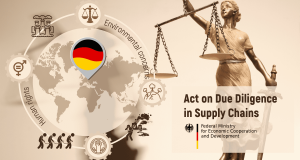Preparedness for the German Supply Chain Act
On the 11th June 2021 German Parliament (Bundestag) passed a new law, the “Gesetz über die unternehmerischen “Sorgfaltspflichten zur Vermeidung von Menschenrechtsverletzungen in Lieferketten” (Supply Chain Act), which requires large companies to conduct due diligence activities through out entire supply chain, regardless where the products and services originate from. The law obliges these companies to identify, assess, prevent and address human rights and environmental abuses within their own, direct and indirect suppliers’ operations irrespective of it’s location.
 The Supply Chain Act imposes significant obligations on companies, which source their products and services through supply chains from developing and emerging countries to sell or trade those in Germany, to comply with human rights and environmental standards and exposes them to potentially serious liability violations any provisions of the Act.
The Supply Chain Act imposes significant obligations on companies, which source their products and services through supply chains from developing and emerging countries to sell or trade those in Germany, to comply with human rights and environmental standards and exposes them to potentially serious liability violations any provisions of the Act.
The final plenary debate and vote on the Act on Corporate Due Diligence in Supply Chains was held in the German parliament (Bundestag) in the morning of 11th June 2021 and was passed by 412 votes in favour, 159 against and 59 abstentions. Subsequently the Act was published in the official Gazette of the Federal Republic of Germany (Bundesgesetzblatt) on the 22nd July 2021. The Act enters into force on the 1st January 2023 – only 10 months from now!
The Act states that in the first phase, from beginning of next year, the law will be applicable to German companies with more than 3,000 employees, which will be reduced to 1,000 from 2024 in order to bring more companies under purview of this Act gradually.
The Act requires these companies to set up processes to identify, assess, prevent and remedy human rights and environmental risks and impacts in their supply chains, and in their own operations. They must also make sure they provide ways for employees of indirect suppliers or sub-contractors (suppliers they don’t have a direct commercial relationship with) to file a complaint alerting the company to human rights or environmental abuses – two fairly broad but well defined areas.
Germany being Bangladesh’s largest trading partner in Europe and the second largest globally, this Act is expected to have profound impact on Bangladeshi exporters to Germany and the EU, which is expected to enact similar Acts besides national legislations of some of the EU Member States soon.
The European Parliament adopted the texts of the Corporate due diligence and corporate accountability Directive on 10th March 2021, which shall enter into force on the twentieth day following that of its publication in the Official Journal of the European Union.
In the fiscal year of 2020-21 Bangladesh’s exports to Germany amounted to US$5.95 billion, according to the statistics of the Bangladesh Export Promotion Bureau (EPB). Germany alone contributed 15 per cent of the country’s total export earnings for the year, standing second in the list after the USA with US$6.97 billion worth of exports.
The main products, which Bangladesh exported to Germany were knit garments T-shirts (US$1.23 billion), non-knit men’s suits (US$1.09 billion), and knit sweaters (US$975 million). During the last 24 years, Bangladesh’s exports to Germany have increased at an average annual rate of 12.4 per cent. The numbers itself explains the significance of Bangladesh German economic relations.
The ready-made garment (RMG) industry of Bangladesh has made significant progress on social and workplace safety over the last decade but still needs to improve on human and labour rights issues, reads a recent Centre for Policy Dialogue (CPD) report entitled ‘State of the UNGPs in the RMG Sector of Bangladesh’. Today, Bangladesh’s RMG sector is a frontrunner in transparency regarding factory safety and value-chain responsibility, according to a McKinsey report.
In the recent years much has been discussed, debated and reported about the International Labour Organisations’ Conventions No. 81, 87 and 98 specifically:
- Labour Inspection (ILO Convention No. 81)
- Freedom of Association and Protection of the Right to Organise (ILO Convention No. 87) and
- Right to Organise and Collective Bargaining (ILO Convention No. 98)
and related matters but a lot more remains to be done as well.
Taking note of the road map of actions submitted in May 2021 and of the report on progress made with its timely implementation submitted in September 2021 by the Government of Bangladesh, the Governing Body of the ILO on the recommendation of its officers:
- requested the Government of Bangladesh to inform it of the progress made in the implementation of the road map to address all the outstanding issues mentioned in the article 26 complaint at its 344th Session (March 2022); and
- deferred the decision on further action in respect of the complaint to its 346th Session (November 2022).
Besides the above mentioned labour right related matters the far greater and real challenges remain ahead to identify, assess, prevent and remedy
- human rights and
- environmental risks
These are expected to remain the Achilles for the export oriented industries of Bangladesh, most notably the RMG, which contributes 84 percent of Bangladesh’s exports. At the same time it is also true that the RMG industry of Bangladesh has also learned a lot about it’s customers and global brand’s mindset, business practices and requirements about various social and legal compliances over the years.
Identify, assessing, prevention and remedy the broad and complex topics like human rights and environmental degradation from the perspectives of the international organisations and legislators effectively and successfully is a whole different league of the game, which not only requires in-depth knowledge about each paragraph and article of the respective and interlinked charters, conventions, directives, guidelines, legal opinions, legislations and regulations, at the least, but also delicate skills for negotiation, communication, representation and reporting of the datasets and facts at hand.
Consequences and penalties for failing to comply with the Act, companies will be fined up-to 2 per cent of the global annual turnover for those with average revenues of more than €400 million. The maximum fine for companies with annual revenues below this threshold is €800,000. For some of the largest German companies this could mean billions of euros in fines per incident. Additionally, exclusion from winning public contracts in Germany for up to three years may be imposed.
Given the far reaching consequences and magnitude of the penalties German and most EU Members States companies are expected to aim for zero-risk approach with their international suppliers and business partners including Bangladesh in order to avoid violation of this Act. Until now, penalties for violation of international labour and social standards were limited to the temporary bad press, social media and some consumers outrage. But now it is going to cost real and hefty amount of money eating up profits in real term, which makes a real difference for business owners, investors and shareholders.
Practical next steps if the law applies to your business in Germany
Identifying and managing risk in your supply chain can be a difficult and time-consuming task, particularly with larger supply chains. Therefore, some of the most effective measures for German companies sourcing from Bangladesh or similar countries and territories would be:
- to have a small but efficient and effective team or a representative on-site with the right sets of skills for negotiation, communication, representation and reporting of the datasets and facts at hand and
- develop, re-assess and refine processes to identify, assess, prevent and remedy human rights and environmental risks and impacts in their supply chains.
Practical next steps if the law applies to your business in Bangladesh
Many Bangladeshi RMG companies have made good progress over the past years – an appropriate system to address the relevant issues of the German Act on Corporate Due Diligence in Supply Chains may be in place. Certainly, all Bangladeshi RMG companies are not up-to the mark for the best communication, representation and reporting to the international buyers, brands and stakeholders.
If Bangladeshi exporters are genuinely determined to solve this last piece of the puzzle, then many of them are bound to achieve far better results by:
- supporting their customers, buyers and brands to avoid non-compliance to the main requirements of the German Act on Corporate Due Diligence in Supply Chains
- putting together a team with the right sets skills and of in-depth knowledge about the German legal and regulatory matters to be a frontrunner and
- take this matter as very seriously because the compliance matters are no longer solely voluntary.
-: END :-
